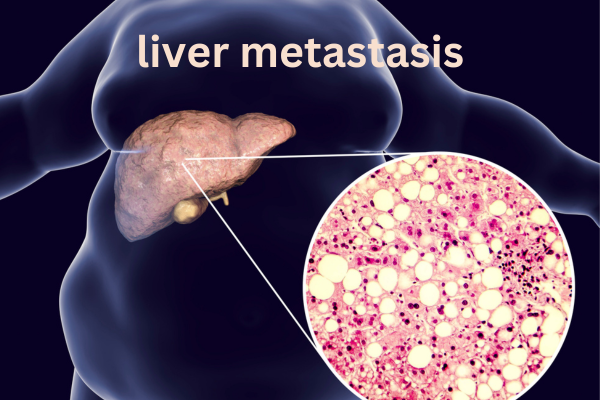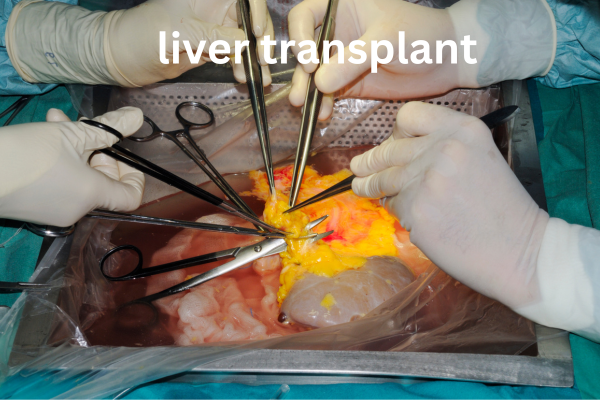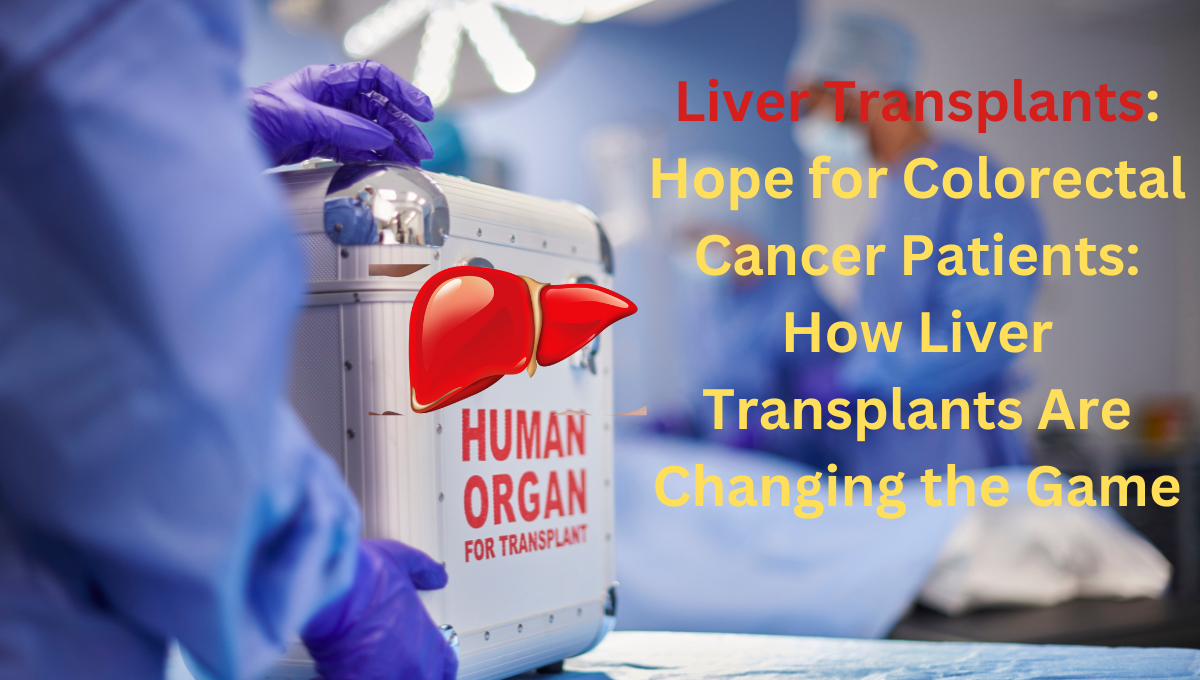Liver Transplants: Hope for Colorectal Cancer Patients: How Liver Transplants Are Changing the Game
Overview
Being one of the most prevalent cancers in the world, colorectal cancer can become extremely difficult to cure if it spreads to other organs. The liver is frequently the predominant location of metastases among the afflicted organs. Selecting the appropriate course of treatment is crucial for patients with liver metastases. But is a liver transplant a feasible treatment for people with liver metastases and colorectal cancer? Let’s examine the specifics and consider our options.
Comprehending Colorectal Cancer

Depending on the cancer’s stage, colorectal cancer, which starts in the colon or rectum, is usually treated with surgery, chemotherapy, and radiation. Nevertheless, there is a concerning propensity for this cancer to migrate to the liver. Treatment for colon cancer becomes considerably more difficult when it spreads to the liver because metastasized cancer cells might damage the liver.
How Do Liver Metastases Occur?
Cancer cells that have traveled to the liver from another area of the body, such as the colon or rectum, are known as liver metastases. This is normal since the liver increases the blood’s exposure to malignant cells by filtering blood from the digestive system. Regretfully, the prognosis may become more difficult and conventional treatments may be less successful if liver metastases are present.
Present Liver Metastasis Treatment Options

The current treatments for patients with colon cancer and liver metastases include targeted radiation therapy, systemic chemotherapy, and surgical removal of the liver tumors. Although these techniques can be useful in reducing the size of the tumors, they are not necessarily a long-term fix. Recurrence is common in patients, and cancers often spread more quickly when they come back.
A Liver Transplant: What Is It?

A healthy liver from a donor is surgically used to replace a damaged liver in a liver transplant. Patients with liver illnesses such as hepatitis, cirrhosis, or liver failure have historically undergone liver transplants. The procedure includes a comprehensive assessment to ascertain the patient’s general state of health, and it frequently necessitates a protracted search for a qualified donor.
A Novel Approach to Liver Transplantation for Cancer Patients
The medical world has begun to investigate the possibilities of liver transplants for individuals with liver metastases and colorectal cancer in recent years. Liver transplants are a common treatment for liver disorders other than cancer, but their application in cases of metastatic cancer is now being studied. Promising preliminary findings have been found in a number of studies suggesting that liver transplantation may considerably increase the survival rate of some patients with colorectal cancer.
Who is eligible for a transplant of the liver?
Not every patient with liver metastases and colon cancer will be eligible for a liver transplant. The tight standards are intended to ensure that there is little chance of cancer returning after transplant. Typically, candidates have no other extensive malignancy, good general health, and controlled or limited metastases. A multidisciplinary team of surgeons, transplant specialists, and oncologists made the choice.
Results and Success Rates
According to preliminary research, people who receive liver transplants and have limited liver metastases from colorectal cancer may have higher survival rates than those who receive conventional treatment. Five-year survival rates have increased dramatically for some patients. It is crucial to remember that these research are still in their infancy and that longer-term data will be needed to draw more firm conclusions.
Perils Linked to Liver Transplants
Risks associated with liver transplants include surgical complications, infection, and organ rejection. There is an added risk for cancer patients after transplantation: cancer could return. Close observation is essential because immunosuppressive medications which stop organ rejection may also encourage the growth of cancer cells that remain.
Advances in the Field of Transplant Surgery
Advances in surgical methods are making liver transplants more widely available. Using living donors, in which a patient receives a partial liver transplant, is one of the novel techniques. Patients with liver metastases may benefit from this option in terms of improved outcomes and shorter wait times.
Transplant as a Component of a Multimodal Therapeutic Strategy
Liver transplants are most successful for many individuals when used in conjunction with other therapies. Chemotherapy, immunotherapy, and targeted therapy are examples of multimodal approaches that can increase the likelihood of success. The combination of therapies slows the cancer’s growth while the liver transplant returns the liver to its normal state.
Difficulties in Using Liver Transplants to Treat Metastatic Cancer
The lack of available donor organs is a significant obstacle to the use of liver transplants for metastatic colorectal cancer. There is a limited quantity of livers available for transplantation, thus giving patients with metastatic cancer priority over those with liver problems unrelated to cancer raises ethical questions. And because of the risk of cancer returning, some doctors are still apprehensive.
Prospective Routes for Investigation and Management
In spite of these obstacles, the future appears bright. Novel approaches to enhance liver transplant outcomes for cancer patients are being investigated through ongoing research and clinical studies. Transplants may become a more popular option for patients with colorectal cancer and liver metastases as more information becomes available.
Patient Testimonials: Prospects for Hope and Healing
Patients with colon cancer and liver metastases who underwent liver transplants have had a number of successful outcomes. These people illustrate the possibilities of this therapeutic option by frequently describing the transplant as a life-saving procedure that has given them a new lease on life.
In summary
Although liver transplants are not yet a common treatment for colon cancer that has spread to the liver, there is hope for the future. According to a recent study, certain individuals may benefit from liver transplantation, possibly living longer and with a better quality of life. Liver transplants might become a more popular choice for people with advanced colorectal cancer as more research is conducted.
FAQs
Is transplantation an option for any patient with liver metastases from colorectal cancer?
Not every patient qualifies. Patients may only be eligible for a transplant if they satisfy certain requirements, such as having few metastases and being in generally good health.
What is the post-transplant survival rate for people with colorectal cancer?
Although preliminary research indicates that survival rates can rise considerably, more extensive investigations are required to yield conclusive results.
What dangers come with liver transplants for those with cancer?
Surgical problems, infection, organ rejection, and the possibility of cancer recurrence as a result of immunosuppressive medication are among the risks.
Are cancer sufferers able to have liver transplants easily accessible?
Liver transplants for metastatic disease are uncommon at the moment, and finding donor organs is still difficult.
Is colorectal cancer curable with a liver transplant?
A transplant is not a cure, but it can remove malignant liver tissue. To be as effective as possible, it needs to be a component of a more comprehensive, multimodal therapy plan.

